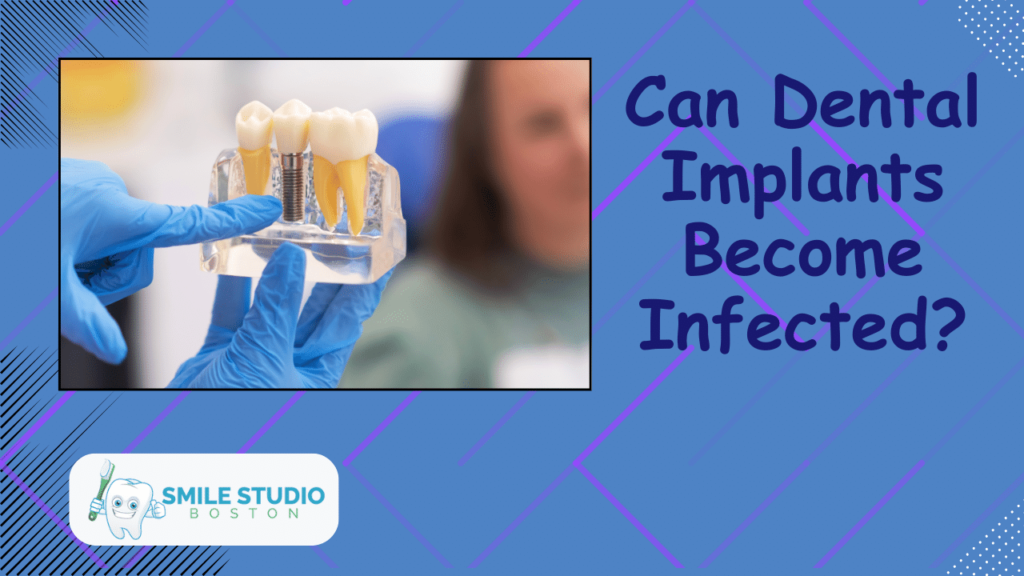Can Dental Implants Become Infected?
Dental implants have emerged as a groundbreaking solution for replacing lost teeth, gaining immense popularity worldwide. Their reliability and natural appearance make them a preferred choice for many. However, even the most successful dental procedures come with certain risks, and dental implants are no exception.
Among the concerns associated with dental implants, infection is a notable one. The question often asked by patients and dentists alike is: can dental implants become infected? It’s essential to acknowledge this possibility, although infections are not common, to ensure patients are fully informed about their dental health choices.
Infections in dental implants, though infrequent, can have serious implications if not treated in a timely manner. This article aims to shed light on the risk factors, preventive measures, and treatment options related to dental implant infections. By being informed, patients can better care for their implants and maintain their overall oral health.
Understanding Dental Implant Infections
When it comes to dental implants, a key concern is the risk of infection. These infections typically manifest in two primary forms: peri-implantitis and peri-implant mucositis.
Peri-Implantitis: A Deeper Concern
Peri-implantitis is the more severe form of infection, affecting both the soft gum tissues and the bone supporting the dental implant. This condition is often a progression of untreated peri-implant mucositis and can lead to significant bone loss around the implant. In severe cases, it may even result in the loss of the implant itself, highlighting the importance of early detection and treatment.
Peri-Implant Mucositis: Early Stage Infection
In contrast, peri-implant mucositis is characterized by inflammation of the gums surrounding the implant without affecting the bone. This is generally a result of inadequate oral hygiene and, if addressed promptly, can be reversible. However, neglecting this early stage of infection can lead to more serious peri-implantitis.
Although the occurrence of infections in dental implants is not a common phenomenon, the potential severity of these conditions cannot be overlooked. Early recognition and appropriate intervention are crucial in preserving the health and stability of dental implants.
Causes of Dental Implant Infections
Oral Hygiene: The Foundation of Dental Implant Health
Maintaining good oral hygiene is paramount in preventing infections in dental implants. Neglecting regular brushing and flossing can lead to plaque accumulation, creating a breeding ground for bacteria around the implant site. This lack of oral care is a primary contributor to implant infections.
The Adverse Effects of Smoking
Smoking significantly increases the risk of dental implant infections. It impairs blood circulation to the gums, slowing down the healing process and weakening the body’s natural defense mechanisms against infections. Smokers considering dental implants should be aware of these increased risks.
Allergies and Systemic Health Conditions
In rare cases, an individual’s allergic reaction to implant materials may lead to infection. Additionally, systemic health conditions such as diabetes can compromise the immune system, elevating the risk of infections around dental implants. It’s crucial for patients with these conditions to have in-depth discussions with their dental professionals about potential risks.
Surgical Standards and Professional Expertise
The skill and experience of the dental professional, along with the sterility of the surgical environment, play a critical role in preventing infections. Any lapse in surgical standards or contamination during the procedure can lead to post-surgical complications. Hence, selecting a qualified and experienced dental professional is essential for minimizing the risk of dental implant infections.
While infections in dental implants are a concern, understanding and addressing these common causes can significantly reduce the risk. Prioritizing oral hygiene, considering lifestyle choices like smoking, being aware of allergic reactions or systemic health conditions, and choosing a competent dental professional are key steps in ensuring the long-term success of dental implants.
Identifying Infection Symptoms in Dental Implants
When exploring the concern of whether dental implants can become infected, it’s essential to be vigilant about the symptoms that may arise. Prompt recognition and treatment of these symptoms are vital in safeguarding the health of the implant and the surrounding tissues.
Key Indicators of Potential Infection
1. One of the initial signs of a possible infection is noticeable swelling or redness around the gums surrounding the implant. This can indicate an inflammatory response that should not be overlooked.
2. Any continuous or intensifying discomfort near the dental implant is a significant symptom. While a degree of discomfort might be expected post-surgery, ongoing pain could be a sign of an underlying infection.
3. If you experience lasting lousy breath or a peculiar taste in your mouth despite maintaining oral hygiene, this could indicate an infection near the implant.
4. Experiencing a fever can suggest that your body is fighting an infection, which may include one in the area of your dental implant.
5. Other signs warranting attention include any implant loosening, pus or discharge from the implant site, and increased sensitivity, especially when chewing or applying pressure.
Spotting these symptoms early and seeking prompt dental consultation is critical. Early diagnosis and appropriate treatment can prevent more severe issues, such as the spread of infection or implant failure. If you notice any of these signs, you must contact your dental professional for an immediate assessment and to discuss potential treatment options.
Preventing Infections in Dental Implants
Ensuring the health of your dental implants involves a proactive approach to prevent infections.
1. Adopting Rigorous Oral Hygiene Practices: Regular brushing twice a day and flossing at least once daily are fundamental in keeping the area around dental implants clean and free from infection-causing bacteria.
2. The Role of Smoking Cessation: Smoking is known to hinder the healing process and increase the likelihood of infections. Therefore, stopping smoking is crucial for the health of your dental implants.
3. Following Post-Surgical Care Recommendations: Adhering to your dentist’s instructions after implant surgery is essential for proper healing. This includes any specific cleaning guidelines and recommended oral care products.
4. Routine Dental Visits for Implant Monitoring: Regular visits to your dentist are essential for keeping an eye on the health of your implants and catching potential issues early.
5. Compliance with Post-Operative Care Instructions: It’s essential to follow all aftercare instructions post-surgery, including taking any prescribed medications and attending follow-up appointments.
Treatment Options for Infected Dental Implants
Different treatment strategies are employed based on the severity and nature of the infection.
1. Dentists often prescribe antibiotics in cases of mild to moderate infection. These can be administered either topically directly to the affected area or orally.
2. Mechanical Debridement: This involves cleaning around the implant to remove bacterial deposits. Techniques might include specialized cleaning instruments or ultrasonic cleaning devices.
3. Surgical Interventions: For serious infections, surgical treatment might be necessary. This can involve the removal of infected tissues and potentially bone grafting, depending on the extent of bone loss.
The choice of treatment depends on various factors, including the severity of the infection and the patient’s overall health. Consulting with a dental professional is essential to determine the most suitable treatment plan.
The Role of Professional Dental Care in Managing Dental Implant Health
Professional dental care is a cornerstone in preventing and managing potential infections in dental implants. Engaging with dental professionals, such as the team at SmileStudio in Dorchester, is crucial for anyone considering this dental procedure.
Before undergoing a dental implant procedure, it’s important to have a thorough consultation with a dental expert. Dentists can evaluate individual risks and tailor advice and treatment plans accordingly. This personalized approach is vital, as it considers each patient’s unique dental history and health needs.
At SmileStudio Dorchester, patients receive comprehensive care that underscores the importance of professional guidance in dental implant procedures. Their expertise is invaluable in helping patients understand the query, “Can dental implants become infected?” and in providing prevention and early detection strategies.
Conclusion
In conclusion, while the risk of infection in dental implants is present, it can be effectively managed with proper care. Good oral hygiene practices, lifestyle adjustments, and adherence to post-surgical care are fundamental in maintaining the health of dental implants. Recognizing early signs of potential infection and seeking timely treatment can prevent complications.
The pivotal role of dental clinics like SmileStudio in Dorchester in providing expert care and guidance cannot be overstated. They serve as a resource for patients to get accurate information and quality treatment.
A consultation with a dental professional is highly recommended for anyone considering dental implants or seeking more information about their care. Do not hesitate to reach out to your dental clinic for advice or to schedule a check-up, ensuring the longevity and success of your dental implants. Book your Appointment with us here. Contact us for more details and informations or visit us here.
FAQs
1. How do I know if my dental implant is infected?
Symptoms of a dental implant infection can include swelling or changes in gum color around the implant, bleeding at the implant site, a loose implant, fever, throbbing in the ear, and persistent pain that doesn’t improve with medication. It’s important to note that moderate swelling can be expected after surgical procedures, but if these symptoms persist or worsen, it could indicate an infection.
2. Can a dental implant get infected years later?
Yes, a dental implant can become infected years after the surgery. This usually occurs in the form of peri-implantitis, an inflammatory condition affecting the gum and bone around a dental implant, and can compromise the success of the implant if left untreated.
3. What is the chance of infection with dental implants?
While the exact probability of infection can vary based on individual circumstances, dental implant infections are generally considered relatively rare. However, factors like poor oral hygiene, smoking, pre-existing gum disease, and systemic diseases like diabetes can increase the risk.
4. Can an infected implant heal?
Yes, if an infected dental implant is diagnosed early and treatment is initiated promptly, it’s possible for the implant to be saved, especially if there’s no significant bone loss. The common treatments include mechanical cleaning, possibly combined with antibiotics or surgery.
5. Can antibiotics save an infected dental implant?
Antibiotics are often used to treat dental implant infections, especially if the infection is diagnosed early. Depending on the severity and location of the infection, antibiotics can be administered either locally at the implant site or systemically. However, antibiotics alone may not be sufficient in all cases and might be used in conjunction with other treatments like mechanical cleaning.
6. How do you fix an infected dental implant?
Treating an infected dental implant typically involves cleaning the area around the implant, known as mechanical cleaning, and may include the use of antibiotics. In severe cases, surgical intervention might be necessary, involving the removal of the infected implant and thorough cleaning of the area. If significant bone loss has occurred, the implant may need to be removed entirely.
For the most accurate diagnosis and treatment, it’s crucial to consult a dental professional, especially if you notice any symptoms of infection. Regular dental check-ups and maintaining good oral hygiene can significantly reduce the risk of implant infections.


